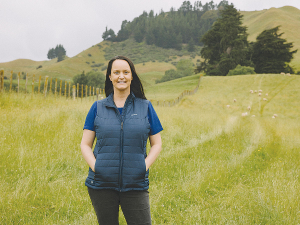Fonterra Milk Price Raised to $9.50/kgMS
As expected, Fonterra has lifted its 2025-26 forecast farmgate milk price mid-point to $9.50/kgMS.
 Rabobank’s Emma Higgins says slowing global milk production will eventually match the tepid demand and prevent further significant price declines.
Rabobank’s Emma Higgins says slowing global milk production will eventually match the tepid demand and prevent further significant price declines.
A full rebalance of China’s dairy market is not expected in the near future, so dairy farmers in New Zealand and around the world will need to manage through more financial pain in the months ahead.
That’s the view in the latest Rabobank Q3 Global Dairy Quarterly report.
However, it says with lower global prices stemming supply growth in key dairy production regions, there is an increasing possibility of a demand resurgence emerging well before milk output can recover – creating a ‘whiplash effect’ in global markets and a bullish run in to 2024.
Co-author and Rabobank senior agricultural analyst Emma Higgins says the severity of the economic headwinds and the duration of the lull in economic growth in China remain uncertain, reducing the likelihood of a strong demand recovery.
A myriad of factors have converged to drive the longed-for dairy demand recovery in China – the world’s largest dairy importer – even further into the future. Lower demand for dairy imports in China has reduced global dairy prices and production.
“Driven by reductions in most key global regions, milk production from the Big 7 export regions is now anticipated to grow by 0.3% year-on-year in 2023, downgraded from last quarter’s estimate of 0.7%. Into 2024 output is expected to climb by 0.4%, far less than the 1.6% annual average gain from 2010-2020,” Higgins explains.
She says slowing global milk production will eventually match the tepid demand growth noted in most regions, preventing further significant price declines.
While the immediate outlook remains challenging, Higgins says there is a ray of optimism for the months ahead as the US Class III milk price and the GDT-weighted average price both fell to Covidlevel lows in recent weeks, allowing buyers to replenish stocks at bargain prices.
Although the Global Dairy Trade (GDT) index has weakened, demand from China still accounts for roughly 30-40% of sales since Q2 and demand from Mexico - the second largest dairy importer - has also been robust.
These factors make a demand-led resurgence in global dairy markets in the months ahead a growing possibility.
Higgins says if buyers feel confident prices have hit a low this cycle and flock to buy products en masse, this could create a shortage of milk and increase demand, creating a whiplash like effect for global dairy prices.
While this may provide some reason for optimism over the coming months, dairy farmers will need to manage through the current financial pain first. Weaker Chinese import demand has seen Rabobank revise its milk price forecast for this season down to NZ$6.75/ kgMS, in line with Fonterra.
Higgins says there are several watch factors for the coming months, which hold both ‘upside’ and ‘downside’ risks for global milk prices.
“Chinese import demand remains the most influential of these, so any signals of increased Chinese buying will be monitored closely, especially due to weaker forecasted milk production growth in dairy export regions.”
The Commerce Commission has finalised new information disclosure requirements for local councils and water organisations that deliver water supply and wastewater services.
Beef + Lamb NZ (B+LNZ) is calling for significant changes to the Government’s reforms to the Resource Management Act (RMA).
NZPork says the Government needs to strengthen its proposed planning laws to ensure New Zealand's pig farmers can continue to produce pork.
Good news for kiwifruit growers - a record crop with forecast per hectare returns at record levels for all fruit categories for the 2025-26 season.
As guests gathered on what is known as the Speaker's Lawn - a beautifully manicured patch of grass behind the main buildings of Parliament - to mingle and enjoy a lamb chop to celebrate National Lamb Day, the mood was very much upbeat.
Global dairy prices are on a roll, recording a fourth consecutive jump on the Global Dairy Trade (GDT) auction this year.

OPINION: The proverbial has really hit the fan in Wellington and exposed a glaring example of a double standard in…
OPINION: Dark suited spin doctors exist to, well, spin, and the nice cuddly progressive types at Greenpeace Aotearoa practice this…